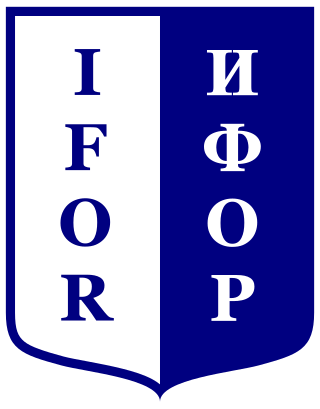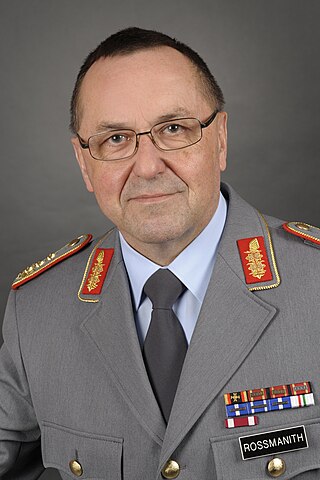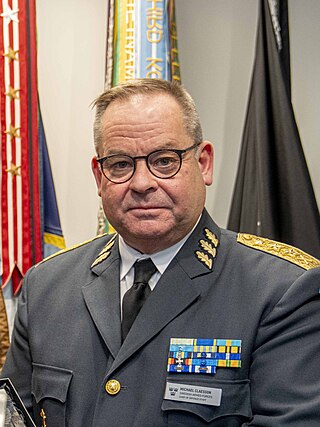
The North Atlantic Treaty Organization, also called the North Atlantic Alliance, is an intergovernmental military alliance of 32 member states—30 European and 2 North American. Established in the aftermath of World War II, the organization implements the North Atlantic Treaty, signed in Washington, D.C., on 4 April 1949. NATO is a collective security system: its independent member states agree to defend each other against attacks by third parties. During the Cold War, NATO operated as a check on the threat posed by the Soviet Union. The alliance remained in place after the dissolution of the Soviet Union and the Warsaw Pact, and has been involved in military operations in the Balkans, the Middle East, South Asia and Africa. The organization's motto is animus in consulendo liber. The organization's strategic concepts include deterrence.

The Armed Forces of the Slovak Republic were divided from the Czechoslovak Army after dissolution of Czechoslovakia on 1 January 1993. Slovakia joined NATO on 29 March 2004. From 2006 the army transformed into a fully professional organization and compulsory military service was abolished. Slovak armed forces numbered 19,500 uniformed personnel and 4,208 civilians in 2022.

Iceland's defence forces consist of the Icelandic Coast Guard, which patrols Icelandic waters and monitors its airspace, and other services such as the National Commissioner's National Security and the Special Unit of the National Police Commissioner. Iceland maintains no standing army, the only NATO member for which this is the case.

The International Security Assistance Force (ISAF) was a multinational military mission in Afghanistan from 2001 to 2014. It was established by United Nations Security Council Resolution 1386 pursuant to the Bonn Agreement, which outlined the establishment of a permanent Afghan government following the U.S. invasion in October 2001. ISAF's primary goal was to train the Afghan National Security Forces (ANSF) and assist Afghanistan in rebuilding key government institutions; it gradually took part in the broader war in Afghanistan against the Taliban insurgency.

The Implementation Force (IFOR) was a NATO-led multinational peace enforcement force in Bosnia and Herzegovina under a one-year mandate from 20 December 1995 to 20 December 1996 under the codename Operation Joint Endeavour.

The Stabilisation Force (SFOR) was a NATO-led multinational peacekeeping force deployed to Bosnia and Herzegovina after the Bosnian War. Although SFOR was led by NATO, several non-NATO countries contributed troops. It was replaced by EUFOR Althea in December 2004.
Eurocorps, located in the French city of Strasbourg (Bas-Rhin), is a multinational corps headquarters. Founded by France and Germany in 1992, it is today composed of personnel from six framework nations and five associated nations. The framework nations place the Eurocorps at the service of the European Union (EU) and NATO, which certified it in 2002 as one of its nine High Readiness Land Headquarters.
The Allied Rapid Reaction Corps (ARRC) is a rapid reaction force maintained by NATO. It is capable of deploying a High Readiness Force (Land) Headquarters at short notice for operations and crisis response.
The NATO Medal is an international military decoration which is awarded to various militaries of the world under the authority of the North Atlantic Treaty Organization (NATO). It is manufactured by Eekelers-Centini Intl, of Hemiksem, Belgium.

Mechanized Infantry Brigade "Iron Wolf" is the core unit of the Lithuanian Army and forms the country's contribution to NATO collective defence. The name of the brigade relates to the Lithuanian mythical character from the medieval foundation legend of the Vilnius city.

Following the terrorist attacks of September 11, 2001, several nations took on Al-Qaeda and the Taliban during Operation Enduring Freedom (OEF) in Afghanistan. OEF was the initial combat operations starting on 7 October 2001, in the wake of the 11 September attacks on the United States, and during 2002 and 2003.

The Multinational Corps Northeast was formed on 18 September 1999 at Szczecin, Poland, which became its headquarters. It evolved from what was for many years the only multinational corps in NATO, Allied Land Forces Schleswig-Holstein and Jutland (LANDJUT). From 1962 LANDJUT had been responsible for the defence of the Baltic Approaches from a headquarters at Rendsburg, Germany. It comprised the 6th Panzergrenadier Division and the Danish Jutland Division.

The Berlin Plus agreement is the short title of a comprehensive package of agreements made between NATO and the EU on 16 December 2002. These agreements were based on conclusions of NATO's 1999 Washington summit, sometimes referred to as the CJTF mechanism, and allowed the EU to draw on some of NATO's military assets in its own peacekeeping operations.
1 German-Netherlands Corps (1GNC) is a multinational formation consisting of units from both the Royal Netherlands Army and German Army. The corps' headquarters also takes part in NATO Response Force readiness rotations. It is situated in Münster, formerly the headquarters of the German Army's I. Corps out of which 1 German-Netherlands Corps evolved. The corps has national and multinational operational responsibilities.

Headquarters Allied Force Command Heidelberg was a formation of the North Atlantic Treaty Organization (NATO) responsible for providing deployable joint staff elements (DJSE) in support of NATO operations worldwide. It was headquartered at Campbell Barracks, Germany, and reported to the Joint Force Command Brunssum (JFCBS). During the War in Afghanistan, it provided command and control elements to the International Security Assistance Force (ISAF). It was disbanded on 1 April 2013.

Lieutenant General Richard Rossmanith is a German Army officer and currently Commander of the Multinational Joint Headquarters Ulm in Ulm, Germany.
The Multi-National Division (South-West) was a military formation which formed part of IFOR, a NATO-led multinational peacekeeping force in Bosnia and Herzegovina under a one-year mandate from 20 December 1995 to 20 December 1996, and then formed part of SFOR, another NATO-led multinational peacekeeping force, from 20 December 1996 until June 2004.

General Christos Manolas is a Greek retired Hellenic Army officer and the former Chief of the Hellenic Army General Staff.

Lieutenant General Leif Michael Claesson is a Swedish Army officer. He currently serves at the Chief of the Defence Staff since 1 January 2023. Prior to this, he served as Chief of Policy and Plans Department in the Defence Staff from 2018 to 2020 and as Chief of Joint Operations from 2020 to 2022. General Claesson will assume the post of Supreme Commander of the Swedish Armed Forces on 1 October 2024.













